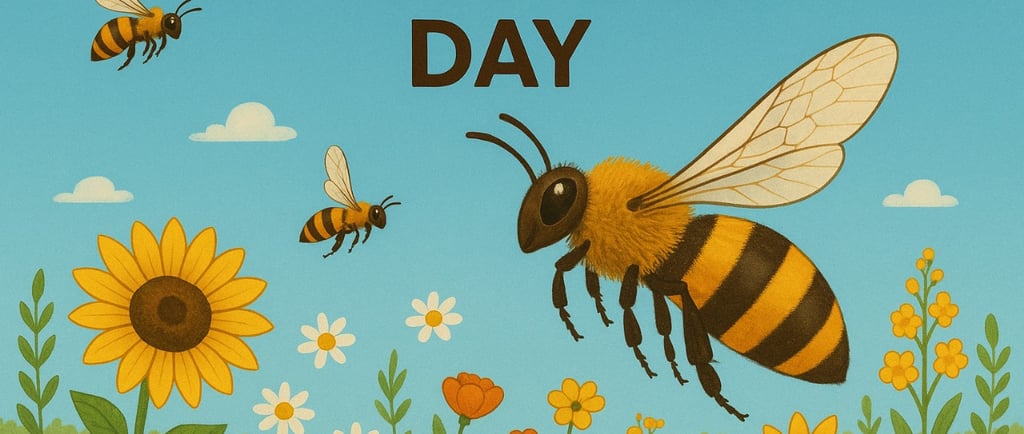World Bee Day 2025: Celebrating Our Pollinators
Explore the significance of bees, threats to their survival, and how you can help protect pollinators this World Bee Day 2025
Muhammad Rehan Aqib
5/20/20252 min read


World Bee Day 2025: Celebrating Our Pollinators
Every year on May 20, we celebrate World Bee Day, a global initiative established by the United Nations to raise awareness about the essential role bees and other pollinators play in sustaining biodiversity, food security, and ecological balance (UN, 2023). This date marks the birth of Anton Janša, a pioneer of modern beekeeping from Slovenia.
Pollinators such as bees are responsible for one out of every three bites of food we eat. Yet, their populations are in serious decline due to human activity, making their conservation a matter of global urgency.
Why Bees Matter
Bees are indispensable for the pollination of over 75% of the world's food crops, including apples, almonds, tomatoes, and coffee (FAO, 2023). They also support the health of wild ecosystems by pollinating native plants that feed and shelter countless species.
Their contribution ensures the reproduction of plants, influences food diversity, and stabilizes ecosystems. In short, without bees, both nature and human livelihoods would face a critical threat.
Threats Facing Bees
Despite their importance, bees are facing multiple interconnected threats:
• Habitat Loss: Urban sprawl, monoculture farming, and deforestation have drastically reduced natural habitats.
• Pesticide Use: Exposure to neonicotinoids and other chemicals has been linked to bee colony collapse (Pollinator Partnership, 2022).
• Climate Change: Shifts in flowering seasons and extreme weather events affect bee foraging behavior.
• Diseases and Invasive Species: Mites such as Varroa destructor and fungal pathogens are decimating hives worldwide.
How You Can Help
You don’t have to be a beekeeper to contribute to pollinator health. Here’s what you can do:
• Plant Bee-Friendly Flowers: Choose local flowering plants that bloom throughout the year.
• Avoid Pesticides: Use natural pest deterrents and support organic farming.
• Support Local Beekeepers: Purchase raw honey and other bee products from trusted local sources.
• Educate and Advocate: Spread awareness in your community and support pollinator-friendly policies.
Join the Global Celebration
World Bee Day is observed across continents with educational campaigns, gardening initiatives, community workshops, and environmental rallies. Schools, NGOs, and governments host events to spark interest and action.
This year, join the movement by planting a pollinator garden, attending a local workshop, or sharing bee facts on social media. When we protect bees, we protect biodiversity, agriculture, and food security.
Conclusion
Bees are tiny heroes that support global food systems, natural landscapes, and the overall health of the planet. Their decline is not just an ecological issue but a socioeconomic one. As we observe World Bee Day 2025, let’s recognize that protecting pollinators is a shared responsibility. The survival of bees is tied to our own.
By planting flowers, avoiding harmful chemicals, and supporting awareness, we can all help reverse their decline. Because when bees thrive, so do we.
References
• Food and Agriculture Organization. (2023). World Bee Day. Retrieved from https://www.fao.org/world-bee-day
• United Nations. (2023). World Bee Day Observance. Retrieved from https://www.un.org/en/observances/bee-day
• Pollinator Partnership. (2022). Why Bees Matter. Retrieved from https://www.pollinator.org
The Beekeeper's Honey
Raw & Pure honey harvested by dedicated beekeepers who prioritize the well-being of their bees and the environment.
Contact us
Subscription
0336 4707747
© 2024. All rights reserved.
